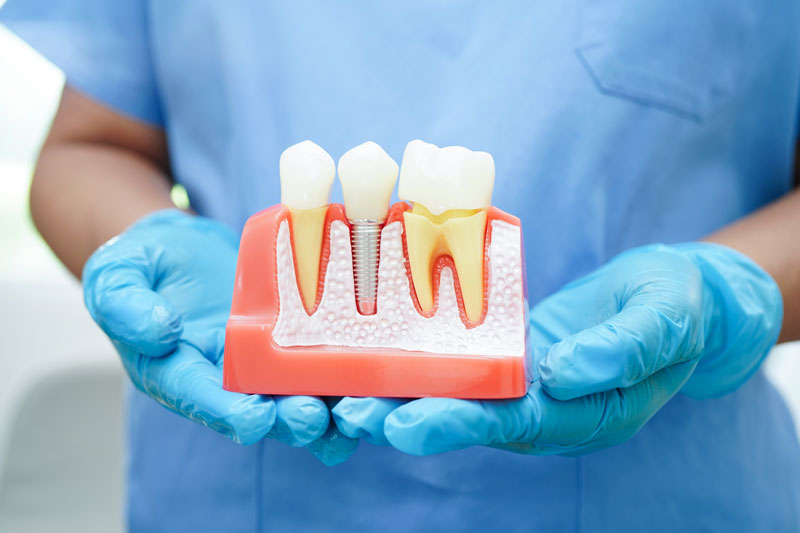Dental Blog- Cypress, TX
Tips, Facts, And The
Latest In Dentistry

Understanding Dental Implants: How and When You Can Get All Your Teeth Replaced

Losing all or most of your teeth can be a life-altering experience, affecting not only your ability to eat and speak but also your self-confidence and overall well-being. Whether tooth loss is due to severe decay, gum disease, aging, or trauma, modern dentistry offers a long-term solution that restores both function and aesthetics. Full mouth dental implants provide a permanent and secure alternative to traditional dentures, giving you the ability to enjoy life without worrying about slipping prosthetics or dietary limitations. Unlike removable dentures, implants are surgically placed into the jawbone, mimicking natural tooth roots and promoting long-term oral health.
By replacing all your teeth with implants, you restore more than just your smile—you regain the freedom to eat, speak, and socialize with confidence. These implants not only improve the appearance of your teeth but also prevent jawbone deterioration, preserving facial structure and reducing the aged appearance often associated with extensive tooth loss. Thanks to advancements in implant technology, options such as the All on 4 and All on 6 techniques make full-mouth restoration more accessible, providing a cost-effective, streamlined approach to regaining a full set of teeth. With the right treatment plan, you can achieve a natural-looking, highly functional, and long-lasting smile.
How Full Mouth Dental Implants Work: A Step-by-Step Overview
Dental implants serve as artificial tooth roots, providing a stable foundation for a full set of replacement teeth. Each implant is made of titanium, a biocompatible material that integrates with the jawbone through a process called osseointegration. This integration ensures a secure and long-lasting hold, preventing the slipping or discomfort commonly associated with removable dentures. Depending on your specific needs, a full arch restoration can be achieved using as few as four to six implants per jaw, significantly reducing the number of implants needed while maximizing stability.
The implant procedure is performed in multiple stages, beginning with a detailed evaluation of your oral health, jawbone density, and overall suitability for the procedure. If you have experienced significant bone loss, a bone graft may be required to strengthen the jaw before implant placement. Once the implants are surgically placed, a temporary set of teeth is often attached, allowing you to maintain functionality while your implants heal. After several months of healing, during which the implants fully fuse with the bone, your custom-designed, permanent prosthetic teeth are secured in place—delivering a fully restored, natural-looking smile.
Who is a Good Candidate for Full Mouth Dental Implants?
While many patients are eager to replace all their teeth with implants, not everyone is an immediate candidate for the procedure. The success of dental implants relies on factors such as sufficient jawbone density, healthy gums, and overall good health. Individuals with uncontrolled diabetes, autoimmune disorders, or active gum disease may require additional medical management before undergoing implant surgery. Additionally, those who have suffered from long-term tooth loss may need a bone graft to rebuild lost jawbone structure before implants can be placed successfully.
A comprehensive consultation with a skilled implant dentist is essential to determine whether this treatment is right for you. Advanced imaging techniques, such as 3D cone beam scans, allow your dental provider to assess the condition of your jawbone and create a personalized treatment plan. Even if you have been told in the past that you are not a candidate for implants, modern advancements in bone regeneration and implant techniques may offer new solutions. With the right approach, most patients can achieve a full-arch restoration and enjoy the long-term benefits of a permanent, implant-supported smile.
The Benefits and Considerations of Replacing All Your Teeth with Implants
Choosing full mouth dental implants offers numerous advantages beyond simply replacing missing teeth. Aesthetically, implants provide a natural appearance, seamlessly blending with facial features and enhancing overall symmetry. Functionally, they restore up to 90% of normal biting power, allowing patients to eat a varied and nutritious diet without discomfort. Unlike traditional dentures, which require adhesives and frequent adjustments, implant-supported teeth remain securely in place, eliminating the hassle of daily removal and maintenance.
However, it is important to consider the cost, healing time, and commitment required for full mouth implants. While the upfront investment is higher than that of conventional dentures or bridges, the long-term benefits far outweigh the initial expense. With proper care, dental implants can last a lifetime, making them a cost-effective and sustainable solution. Additionally, the healing period varies for each patient, but most individuals experience minimal discomfort and resume normal activities within a few days of surgery. Ultimately, the decision to replace all your teeth with implants is a life-changing investment in your health, confidence, and overall quality of life.
Are you ready to restore your smile with dental implants at our skilled and trusted dental practice? Don’t wait to get the smile of your dreams with us. Get in contact with our doctor, Dr. Giancarlo Aymerich and our exceptional team at our practice to schedule an appointment today!



